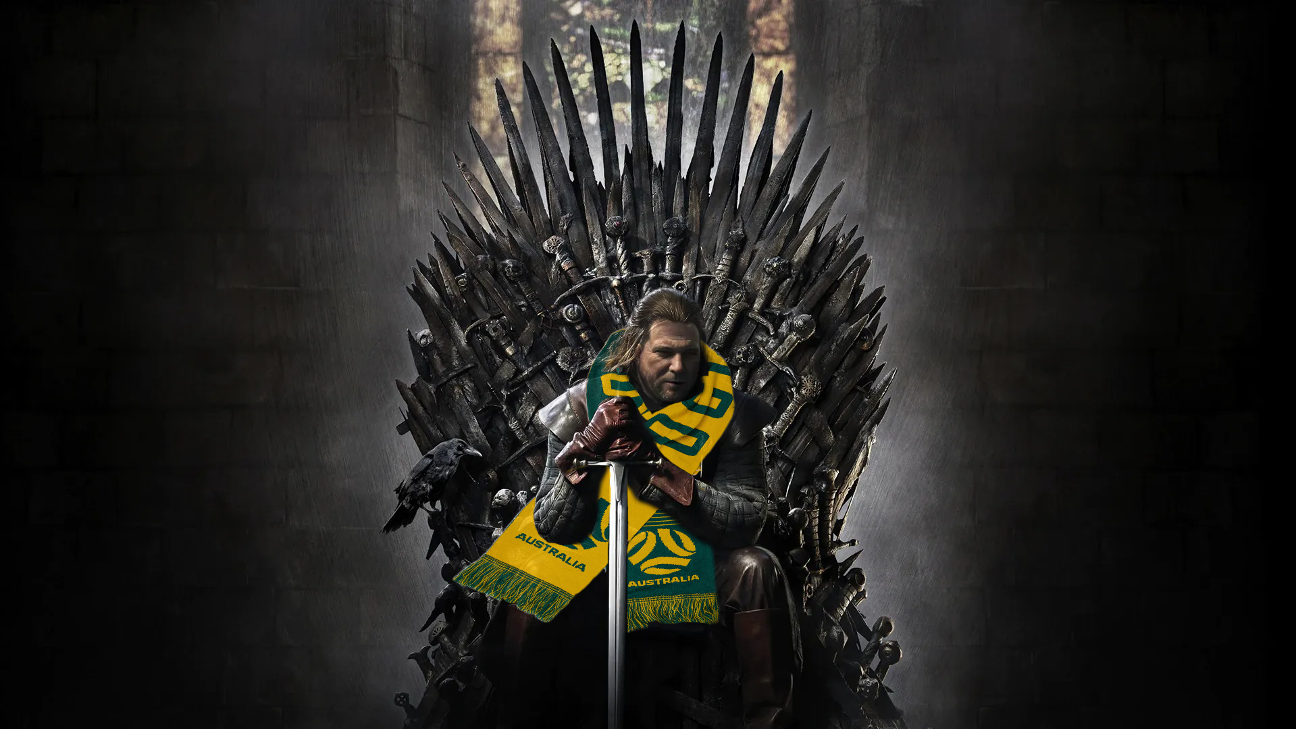Australian football can be said to be many things, but routine isn’t one of them. Nor could it be said that it’s particularly good at timing the various periods of upheaval that befall it so that they do not coincide with what happens on the grass. James Johnson making the call to step down as chief executive of Football Australia, with board member Heather Garriock stepping in as an interim as the federation undergoes a recruitment process for a replacement, is just the latest example.
Amid A-League Men and A-League Women finals series, and weeks away from the Matildas and Socceroos returning to action, focus has swung back to the corporate boxes ahead of this weekend’s annual general meeting. The hunt is on for a new chief executive, one who will inherit a landscape in which there is strength to be found and opportunities to be built upon, but in which challenges and roadblocks loom. Because Johnson has left a lasting mark on Football Australia, and not just because he oversaw its rebranding from Football Federation Australia.
How Johnson is remembered will be subjective. Consensus will likely be, and probably should be, that he was one of the more effective administrators Australian football has had, as well as one of the best-intended. Who will follow remains unknown; names such as Garriock, Football Queensland CEO Robert Cavallucci, former players’ union boss Brendan Schwab, former FIFA director James Kitching, Football Australia executive Peter Filopolous, and Tottenham Hotspur chief football officer Scott Munn have all been flagged to ESPN as potential successors.
It’s been noted across the game that Garriock has been the subject of a noticeably strong PR push since she assumed the role; a much stronger one than would normally be expected of an interim not positioning themselves to remove that tag. Munn’s position, meanwhile, is uncertain as former Arsenal chief executive Vinai Venkatesham arrives in the same role at Spurs, in addition to reports that former managing director of football Fabio Paratici is eying a return. Meanwhile Filopoulos, who recently became the federation’s chief customer, brand and marketing officer amid a restructuring, made what certainly appears to be a pitch for the job on LinkedIn last week.
Football Australia will engage in one of their greatest traditions — a “worldwide search” for a replacement — and while there would likely be few objections to a qualified international, there appears to be little appetite for a return to the days of executives from other sports being parachuted in.
Retrospectively, securing and hosting the highly successful 2023 FIFA Women’s World Cup, capturing the public’s imagination in a manner that had hitherto been unthinkable for football, and giving the Matildas the necessary support to allow them to elevate themselves to Australia’s most beloved national team, will undoubtedly go down as Johnson’s biggest accomplishment. In the video showing FIFA’s announcement that the World Cup was heading Down Under, one can see Johnson receive a text and start to smirk before the Gianni Infantino provides formal confirmation, illustrative of the international connections that Johnson — a former FIFA, Asian Football Confederation, and City Football Group employee — brought to the role and which helped elevate Australia’s standing on the global stage.
Having hardly got his feet under the desk, Johnson was at the helm through the existential threat that was the COVID-19 pandemic, negotiated a divorce with broadcaster Fox Sports and inked a new deal with Paramount, and — after a bitter governance civil war saw the game squander significant goodwill before his arrival — completed the unbundling of the A-Leagues from the federation. Showing a notable level of ambition for an Australian football executive, he pushed for transformation of regulations surrounding licensing and player movement, and set in motion the launch of a second-tier competition — the Australian Championship — that will kick-off later this year. Successful continuations of the latter initiatives by his successor could see Johnson’s reputation even further burnished.
The Matildas secured best-ever fourth-placed finishes at the Women’s World Cup and Olympic Games amid his tenure, and the Socceroos recorded their most successful men’s World Cup in Qatar in 2022, while Tony Gustavsson and Tony Popovic were both hired under Johnson’s watch. There was greater investment in junior national teams and a landmark collective bargaining agreement with the players’ union that secured world-leading rights and protections for Australia’s stars, particularly in the women’s game.
Admittedly, the reputation of Johnson’s Football Australia has been bolstered — and some of its challenges and missteps obfuscated — by shedding itself of the responsibility for running the A-Leagues. It’s been addition by subtraction. So, too, has a contrast with A-League administrators, the Australian Professional Leagues (APL) lurching, sometimes bumbling, its way from one crisis to the next.
But even with this A-League-shaped smokescreen, it hasn’t always been smooth sailing. Popovic’s appointment, for example, only came because Graham Arnold stepped down just under two years into a four-year contract extension that was hastily signed after the Qatar World Cup success. An increasingly farcical 10-month wait for a new Matildas boss — which has been led by the board’s football development committee, where Garriock plays a leading role — continues to drag on. The relationship between Football Australia and embattled APL has flitted across various degrees of strain despite proclamations, in both public and private, of goodwill; the latest salvos there came within the last month, with Macarthur FC taking Football Australia to court, followed by reports emerging that at least half of the federation’s losses are due to bad debt from the APL.
There have been consistent calls from the players’ union for the federation to adopt a more collaborative approach, and lay out a clear vision for the future, and there was a pay dispute with the Matildas as recently as February. The execution of a new national registration platform, PlayFootball 2.0, has been littered with challenges that have infuriated grassroots participants and left volunteers at their wits’ end, and the opaque process that led to the Australian Championship had its rancour nor did it produce a home-and-away, standalone model that it so desperately needs for long-term viability. Then there were those initiatives such as the Women’s Australia Cup or Starting XI advisory group that were launched with much fanfare, only to be followed by radio silence.
Nonetheless, whoever does assume Johnson’s role will have strengths to build upon — for one, they’ll hopefully not have to deal with a global pandemic. But they will also benefit from a home Women’s Asian Cup next year, as well as an ongoing bid for the men’s Asian Cup in 2031. Generational change may loom, but the Matildas remain a commercial juggernaut, and the Socceroos are well-placed to qualify for the men’s World Cup next year, elevating their status and giving Football Australia revenue from two major tournaments in 2026.
Australian players, coaches, and executives are increasingly in demand across the globe as the country, bolstered by Johnson’s international standing, begins to shake off some of its provincial reputation. Regulatory reforms in transfer regulations and club licensing provide a foundation for further development, as does a newly launched infrastructure plan. Johnson will temporarily remain at Moore Park at the request of the board to aid a transition, and sources have said this should help conclude projects to strengthen the federation’s standing. There is always football’s bedrock too, with the game continually able to boast Australia’s largest participation base in any team sport.
But there will also be challenges.
The A-Leagues remain in a perilous state and, given their exclusive control of the Australian top flight, that has flow-on effects to the whole game. Of particular concern is the A-League Women, and how that continues to professionalise and grow as the Asian Cup comes to town. Just as it did before the APL entered a period of brutal austerity, swelling headcounts at Football Australia have raised eyebrows across the industry, and a reported blowout in national team costs is understood to focus on junior national team activity — with the negative trade-offs of cutting back on these are obvious.
The launch of the Australian Championship is historic, but it won’t be secure long-term unless there’s a clear and collaborative vision for its future, nor a strategy for broadcast and commercial viability. Issues surrounding unity and the cost to play and to coach — especially at elite developmental levels — remain, and growing grassroots participation needs to be serviced.
In-house, there appears to be upheaval at Football Australia too, with a number of senior staff leaving the organisation over the past few months. The ramping up of board involvement in what should be the responsibilities of the executive and staff is not in line with good business practices, with multiple insiders and other figures within the industry flagging to ESPN that this as a particular area of concern.
Inevitably, appointing Johnson’s successor will play out against a background of subterfuge and politics that would put Game of Thrones to shame; if anything abhors a vacuum more than nature, it’s Australian football when there’s leverage to be seized and power bases strengthened. Soon after Johnson’s exit was announced, retired Australian journalist Ray Gatt angrily posted on social media, rebuking unnamed parties trying to enlist him in their efforts to shape the narrative. That it is all happening against a backdrop of restructuring and it being just days from the federation’s annual general meeting — where a loss of over AU$8 million will be reported — means that we’ll probably have eight different versions of a carefully curated reality emerge.
Australian football governance. It’s never boring. Even if it should be.




